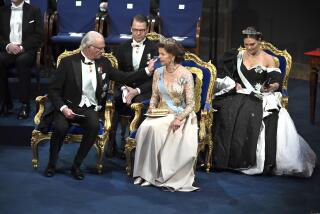Swedish Nobility to Bow Out of Link to Government
- Share via
STOCKHOLM — What France and Russia did with guillotines and firing squads, Sweden is doing with the stroke of a pen.
In March, Parliament is expected to separate the nobility from the affairs of state once and for all. The monarchy is safe, but the 600 aristocratic families represented in the House of Nobility in Stockholm will lose a link to the government that became ceremonial and meaningless long ago.
The only surprise, perhaps, is that the final break has taken this long, given Sweden’s famously egalitarian instincts and its membership in the new, united Europe of peaceful and stable democracies.
“We’re taking the last step into the age of democracy,” said Roger Pettersson, the government official who drafted the proposal. “It’s symbolically wrong that an old remnant from undemocratic times should remain in modern society.”
In many European countries, the nobility died with the monarchy in the ashes of two world wars. In France, it happened much earlier, after the 1789 revolution. Where aristocracies do survive, as in Sweden, they have no privileges.
Even in Britain’s House of Lords, one of the only unelected chambers that still have a say in making laws, the 750 hereditary dukes, marquesses, earls, viscounts and barons are being ousted, leaving only lifetime members whose titles die with them.
Sweden’s nobility dates to 1280, when King Magnus Ladulaas gave a tax break to landowners who agreed to serve as cavalry leaders in his army.
Swedish noblemen agreed to shed their economic and political privileges in 1865, and settled for a very limited and one-sided relationship with the government. The 26,000 nobles have no say in government decisions, but the government gets to approve changes to the noblemen’s charter. That includes arranging summits of nobility and financing upkeep of the 328-year-old Riddarhuset, or House of Nobility, a striking Renaissance palace in Stockholm’s Old Town.
Still, some say recognition of even a wholly toothless institution over dignifies it and is a painful reminder of a time when people inherited their station in life. It has no place, they say, in a modern welfare state that has been ruled by the left-leaning Social Democratic Party for 61 of the last 70 years.
“The nobility is a remnant from feudal society,” said Bengt Silfverstrand, a former Social Democratic lawmaker who pushed for the legislation. “They can keep having their summits, but there’s no reason for them to be linked to the government.”
If the proposal is approved by the Riksdag, the elected Parliament, the charter of the House of Nobility will lose its legal status. The nobility won’t be abolished, but reduced to the legal standing of an amateur soccer club.
The legislation will also annul the oldest statute in Swedish law -- the 1723 letter that grants noblemen obsolete privileges such as the right to leave the country without the king’s permission and royal assistance if they are captured as prisoners of war.
Neutral Sweden hasn’t fought a war since 1815, and King Carl XVI Gustaf can’t bar anyone from leaving. He also lost the right to confer titles in 1974.
Henric Ankarcrona, chairman of the House of Nobility, said the proposal wouldn’t affect the organization’s mission: to conduct genealogical research and manage some 300 foundations.
“We can live with it,” he said, the Ankarcrona coat-of-arms glistening from a green ring on his left pinkie. “The times are changing, and we have to change with them.”
Ankarcrona, whose family was ennobled in 1717, said the house had not heard from anyone opposing the changes, but individual noblemen said they were unnecessary.
“Why even bring up the whole thing and spend money and effort on something that doesn’t have any relevance at all?” Count Johan Lewenhaupt asked.
Lewenhaupt sits in the first row at the all-male summit of family heads held every three years at the House of Nobility. Participants are seated according to rank -- counts and barons up front, untitled nobles in the back. The large hall is decorated with more than 2,000 copper shields bearing the names and coats of arms of living and extinct families. Upkeep is paid for by an annual 150-kronor ($18) levy on every male noble.
Lewenhaupt says he doesn’t understand why the change is coming now, rather than in the 1960s or 1970s, when leftism was in vogue and some bluebloods would conceal their background for fear of ridicule.
“When I was in school, there were times when I would rather have been called Johan Karlsson than Johan Lewenhaupt,” he said. “All eyes were on me and I was called a ‘count brat.’ ”
Of late, however, nobility is back in vogue. The House of Nobility is locked in several legal battles with Svenssons and Anderssons seeking to adopt noble-sounding names.
In a country where more than a quarter of the 8.9 million people have surnames ending with “son,” noble names stand out. Some are related to a coat of arms, like Svinhufvud (swine head), Natt och Dag (night and day) or Ankarcrona (anchor crown).
Others have foreign roots, like De La Gardie (France), Hamilton (Scotland) and von Schwerin (Germany). Several Swedish names reveal a German influence, such as Lewenhaupt (lion head) or Pantzerhielm (armored helmet).
Swedes may pride themselves on being a classless society, but a blueblood name can still help get you into high society.
Annika Reutersward (knight sword), a 28-year-old bank clerk in Stockholm, says it helps get her into fancy dinner parties.
“It’s a great bonus,” Reutersward said. “The name sticks out and is visible, and I enjoy that.”
Lilli-Ann Rundblad, a non-noble who has researched the Swedish aristocracy, says noblemen are still overrepresented among company board members and ambassadors. She said they’re also prominent in arts, media and, to a lesser extent, in politics.
“It’s fantastic how close-knit they actually are,” she said. “They pat each other on the back.”
Rundblad said some nobles start forming networks in school, and help each other through university and professional life.
Famous Swedish noblemen include Pehr G. Gyllenhammar (golden hammer), a former chief executive of Volvo, and Dag Hammarskjold (hammer shield), the late U.N. secretary general.
Hollywood actor Jake Gyllenhaal is descended from Swedish nobility, but actor Max von Sydow isn’t, despite the aristocratic-sounding “von.” Nor was Alfred Nobel of prize-giving fame.
At the House of Nobility, officials say today’s aristocrats are spread across all social classes and political persuasions. They play down the significance of a noble name, saying it is merely of genealogical interest.
Said outgoing secretary Otto von Schwerin, sitting in a dimly lighted office decorated with portraits of grim-faced noblemen: “It’s like inheriting an old watch.”
More to Read
Sign up for Essential California
The most important California stories and recommendations in your inbox every morning.
You may occasionally receive promotional content from the Los Angeles Times.













